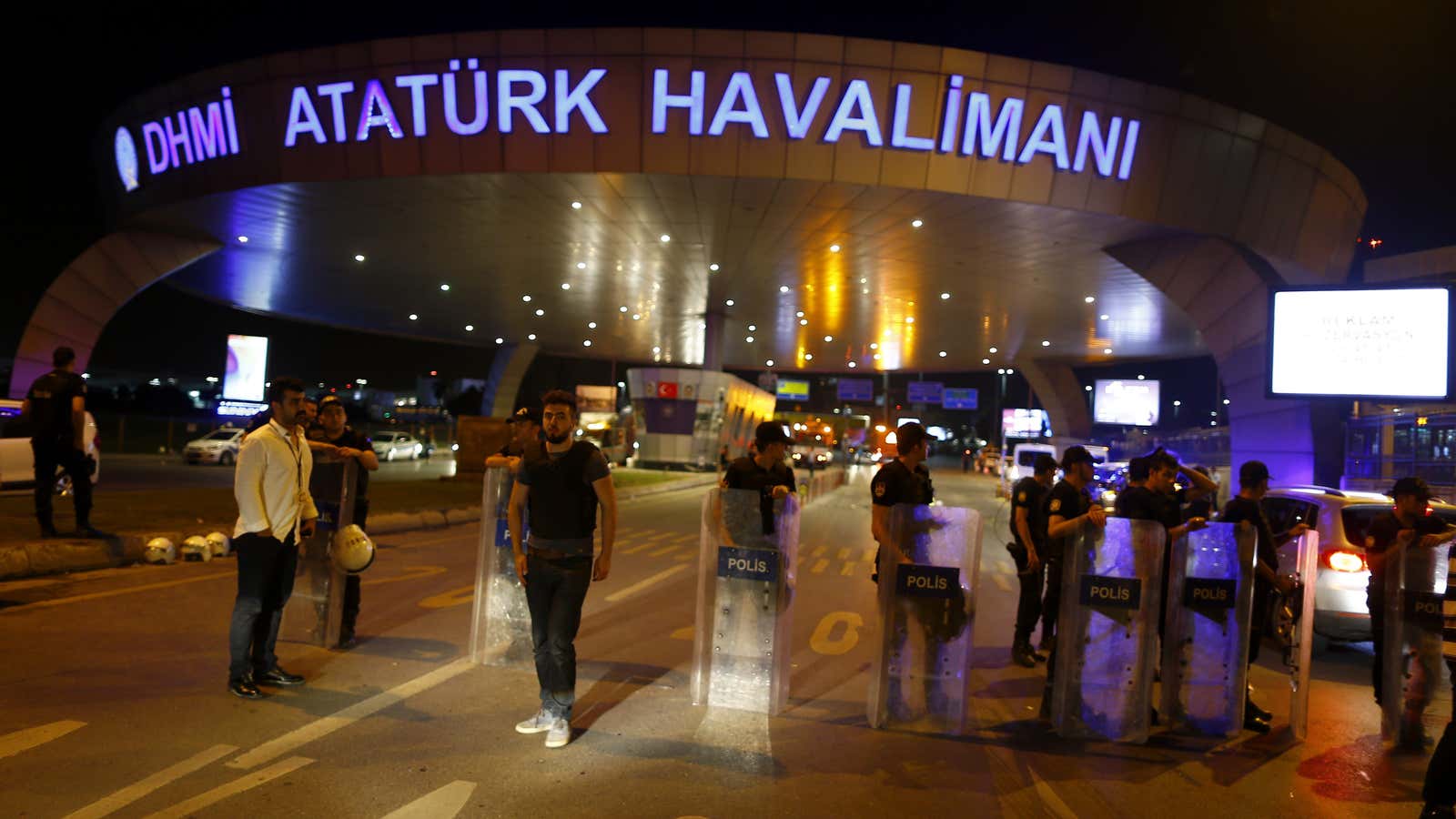Istanbul, Turkey
In one second, the evening went from laughter and camaraderie to frantic messages. I was out with friends late on June 28 when a news alert brought the evening to a halt: Explosions and gunfire at Atatürk Airport, the heart of Turkish tourism and the third largest airport in Europe. As the minutes turned into hours, it would become increasingly difficult to get a sense of the situation.
One thing I did know: Facebook enabled its controversial Safety Check feature for users living in the city. Once Facebook alerted me to the Safety Check for the attack on the airport, I immediately marked myself as safe and heaved a sigh of relief as all of my friends marked themselves safe, too. But that network soon became difficult to reach.
At 1:06AM on June 29, several hours after the attack, Facebook and Twitter became inaccessible, according to Turkey Blocks, an internet watchdog group.
It’s common knowledge in Turkey that the internet slows to a trickle in the aftermath of tragedies like the one at Atatürk Airport that killed 41 and injured well over 200. To access blocked news, locals and foreigners alike make recommendations for various virtual private networks (VPN), to route your connection through a server in a different country.
Having lived in Istanbul for over a year and a half, I’m familiar with the online routine that follows these tragedies in Turkey. Word of an attack appears online, either in a post on social media or a breaking news alert. Then, everyone looking for reliable information jumps onto social media. Soon internet speeds slow to a trickle and social platforms are throttled. At that point, VPNs become essential.
In the hours following the attack, people in Turkey took to Twitter to talk about the social media blackout.
Around the world, social networks have been both essential for citizens and a hassle for governments. Back in 2009, following the reelection of Iranian president Mahmoud Ahmedinejad, Twitter and Facebook were blacklisted once everyday Iranians began using the platforms to voice objections to the heavily contested presidential election. These protests became known as the Green Movement. Given how central Twitter was, the movement was also known as the Twitter Revolution.
Earlier this year in Brazil, a judge ordered a 72-hour ban of Whatsapp in an effort to get information from communication between drug gangs. Most of the country was up in arms over the decision because over 100 million Brazilians rely on Whatsapp, but they migrated quickly to alternative apps like Telegram.
Twitter skyrocketed to prominence in Turkey during the Gezi Park Protests in 2013, which saw a massive pushback against the government’s attempt to build a military barracks in Gezi Park. The 140-character social network became the main avenue for sharing information and organizing.
“I’ve been using Twitter for the last three or four years,” said Hatice Özçelik, a marketing manager in Istanbul. She doesn’t trust mainstream media sources, neither Turkish nor Western, and finds posts on social media to be more reliable in Turkey. Özçelik lives very close to the airport, and has friends who work at the airport and at a nearby hospital in the neighborhood of Bakırköy, which treated victims.
Officially, Turkey bans the dissemination of images and news in the aftermath of national tragedies, per the Supreme Board of Radio and Television. The rationale is that sharing information and images compromises national security—but that often means people inside Turkey can’t get a proper sense of what’s going on.
After the worst terrorist attack in Turkey’s history in October 2015, Human Rights Watch and many other organizations penned an open letter to the Turkish government calling on them to refrain from online censorship ahead of a major parliamentary election. The government has not admitted any role in censorship of such networks, and the companies themselves have been silent on the issue.
“Unless the likes of Twitter and Facebook comes forward (or ISPs for that matter) and provides data, we cannot prove it,” said Yaman Akdeniz, a cyber rights specialist and academic, of the government’s purported involvement in banning social networks. ”By keeping silent about these issues, major US companies like Twitter and Facebook are aiding the undemocratic practices of the Turkish government.”
